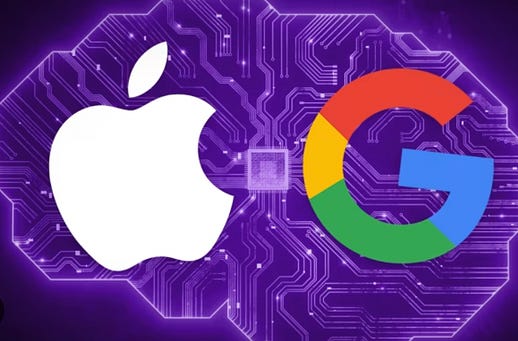🔐 The Battle for AI Privacy Apple vs. Google.Plus: Protesters Leverage AI to Enhance Antigovernment Efforts, AI Tools, and more.Get in Front of 50k Tech Leaders: Grow With Us Hope you're enjoying the long weekend! As AI technology advances, privacy becomes increasingly crucial. In this edition, we compare Apple AI vs. Google AI, examining their privacy measures—a story that will continue to evolve as tech companies expand and collaborate. We also cover Meta's new prediction model and how protesters are leveraging AI in their efforts. Let's dive in!
📰 AI News and Trends
🌐 Other Tech news
Protesters Leverage AI to Enhance Antigovernment Efforts.Kenyan protesters are leveraging AI and digital tools to enhance their anti-government efforts. This youth-led movement, initially sparked by the now-canceled Finance Bill 2024 and its unpopular tax hikes, has seen the creation of various AI tools like Corrupt Politicians GPT and Finance Bill GPT to expose corruption and explain legislative impacts. The protesters, predominantly Gen Z and millennials use platforms like TikTok and X to organize, live-stream, and crowdfund, raising over $231,906 for medical and funeral expenses. They also employ apps like Zello for real-time coordination and translate content into local languages to broaden their reach. Despite government concerns over AI misuse, including misinformation risks, the tech-savvy youth continue to innovate and mobilize for political change. Meta’s Multi-Word Prediction Model is a Game Changer.Meta has released new pre-trained models using a multi-token prediction method, enhancing large language models (LLMs) by predicting multiple words simultaneously. This approach promises better performance and faster training, making AI development more efficient and sustainable. While this innovation could democratize AI and improve tasks like code generation, it also raises ethical concerns about misuse. Meta's strategic release on Hugging Face aims to foster open science and innovation, positioning the company as a leader in AI development. 🧰 AI ToolsAudio Editing
The Battle for AI Privacy Apple AI vs. Google AI.Apple's new "Apple Intelligence" AI architecture focuses on privacy, contrasting with the "hybrid AI" approach of Samsung and Google. Announced at the Worldwide Developers Conference, it processes core tasks on-device and uses Private Cloud Compute (PCC) for complex requests, aiming to protect user data. This method masks AI prompt origins and prevents data access, offering end-to-end encryption-like security. While Samsung and Google emphasize their hybrid AI's privacy controls, some data still leaves devices for cloud processing, posing potential risks. Apple's collaboration with OpenAI introduces further scrutiny on privacy, highlighting the ongoing battle for AI security and user trust. Here are the key differences in privacy approaches between Apple and Google: Key differences:
It's worth noting that both companies claim to prioritize user privacy and security, but Apple's approach so far appears to offer a more comprehensive privacy-focused architecture for AI processing. 🚀 Showcase Your Innovation in the Premier Tech and AI Newsletter (link) As a vanguard in the realm of technology and artificial intelligence, we pride ourselves in delivering cutting-edge insights, AI tools, and in-depth coverage of emerging technologies to over 55,000+ tech CEOs, managers, programmers, entrepreneurs, and enthusiasts. Our readers represent the brightest minds from industry giants such as Tesla, OpenAI, Samsung, IBM, NVIDIA, and countless others. Explore sponsorship possibilities and elevate your brand's presence in the world of tech and AI. Learn more about partnering with us. You’re a free subscriber to Yaro’s Newsletter. For the full experience, become a paying subscriber. Disclaimer: We do not give financial advice. Everything we share is the result of our research and our opinions. Please do your own research and make conscious decisions. |
Friday, July 5, 2024
🔐 The Battle for AI Privacy Apple vs. Google.
Subscribe to:
Post Comments (Atom)




No comments:
Post a Comment